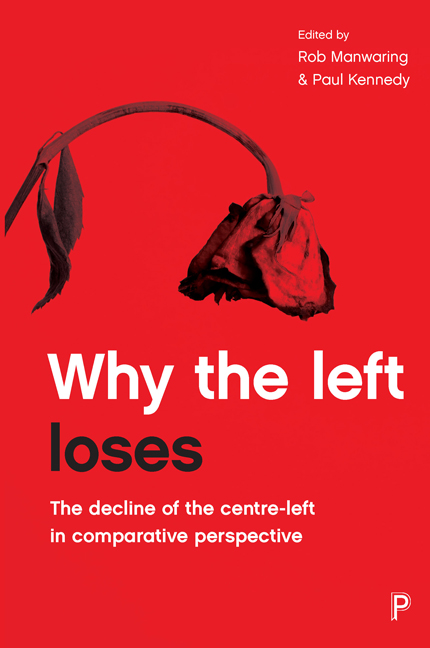Book contents
four - The ‘soft target’ of Labour in New Zealand
Published online by Cambridge University Press: 08 April 2022
Summary
At the 2014 general election, the New Zealand Labour Party suffered what was arguably its worst election defeat ever, gaining 25 per cent of the party vote. One has to go back to 1922 to observe a lower level of electoral support. But in those days, Labour was a new party (formed in 1916) and was rising towards its historic victory of 1935, so the two results are hardly worth comparing. To make matters worse, 2014 was the third electoral defeat in a row to the centre-right National Party that had been in office since 2008. So why was Labour losing?
This chapter covers the period from 2008 to 2015, but some background is called for. Prior to the 2008 election, a three-term Labour-led government under Prime Minister Helen Clark followed a Blairite ‘Third Way’ model. It moderated some of the policies of the more radical neoliberal years (1984-96), but the fundamentals of neoliberal reform, such as financial openness, central bank independence and fiscal responsibility, were kept in place. Some critics saw the Clark government as embedding neoliberalism (Kelsey, 2002); others observe that some of their policies ignored or even reversed the ‘radical’ neoliberal model set out by the Treasury in 1987, especially in public management (Chapman and Duncan, 2007). Clark's Labourled government did not satisfy all social democratic aspirations, but its dominance in the 2000s showed that it was the first to master the art of political management under the mixed-member proportional representation system in place since 1996. So Labour took office in 1999 through a formal coalition with the (now defunct) leftwing Alliance Party, and it survived the two subsequent elections as a minority government with confidence-and-supply agreements with minor parties. Nine years in office was a good run for Labour, exceeded only by the first Labour government (1935-49). Defeat came in 2008, however, in an election held shortly after the global financial crisis (GFC), and John Key's National Party-led government took over the reins. The recession that New Zealand experienced at that time could not be blamed on either the Labour-led or National Party-led government, but it did effect the latter's revenues and fiscal options. Nonetheless, Key promised ‘no radical reforms’, and so voters could aim for a change of government without jeopardising the achievements of the Clark years (Franks and McAloon, 2016).
- Type
- Chapter
- Information
- Why the Left LosesThe Decline of the Centre-Left in Comparative Perspective, pp. 53 - 68Publisher: Bristol University PressPrint publication year: 2017



